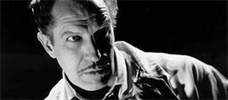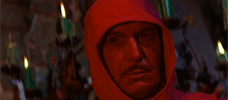Reviews
The City Under the Sea
Jacques Tourneur
UK, 1965
Credits
Review by Lindsay Peters
Posted on 29 June 2011
Source MGM DVD
Categories Vincent Price
Known as Jacques Tourneur’s final sputter of a film, War-Gods of the Deep is one of the more forgettable titles from Vincent Price’s American International Pictures era. Occasionally referred to by its alternative release titles, City in the Sea or City Under the Sea - as Price’s character laconically observes, “one name is as good as any” - War-Gods of the Deep remains a passably interesting relic of 1960s drive-in fare only for the grace of Vincent Price’s leading role.
During the turn of the 20th century on the Cornish coast, American engineer Ben Harris (1950s teen idol Tab Hunter), and hapless, chicken-toting artist Harold Tufnell-Jones (David Tomlinson, in his follow-up to Mary Poppins) investigate a string of mysterious thefts and murders, each of which is marked by a mysterious trail of seaweed. In their search for the kidnapped Jill Tregellis (Susan Hart), they discover a passage to an underwater city. The Captain (Price) is the self-righteous ruler of this city, whose inhabitants never age due to the lack of ultraviolet light. It is soon revealed that the Captain had Jill kidnapped because he believes her to be the reincarnation of his dead wife—this attempt at establishing character depth is conveyed through a Vertig-inous use of portraiture that is never fully explained.
Laden down with armored atmospheric diving suits, the film climaxes with one of the least-riveting chase scenes ever put to film. Henchmen half-heartedly attempt to spear their runaway prisoners, whose supposed terror is halfheartedly expressed through a series of mismatched reaction shots. Even the allegedly lithesome “gill-men,” clad in a mixture of white rubber, leaves, seaweed, and gardening gloves, appear sluggish and disinterested in out-swimming their victims. After Ben, Jill and Harold escape, the city is destroyed by an erupting volcano, and the Captain dies from sun exposure while in pursuit.
As the villainous counterpart to the thinly drawn heroic trio, Price is, of course, the bright spot in this convoluted sci-fi adventure tale. The seventh of the eleven AIP Edgar Allen Poe adaptations in which he would appear, and his second collaboration with Tourneur after The Comedy of Terrors, Price manages to wrestle every last shred of believability out of such grandiose lines as his character’s declaration that he is “death, looking gigantically down from my tower.” Despite Price’s unparalleled gift for imbuing his characters with the parodic pathos his lines were often lacking, his Captain is, sadly, not enough to save the film.
War-Gods of the Deep does, however, contain brief glimmers of Tourneur’s subtle hand. The enigmatic sensuality that defined earlier Tourneur gems like Out of the Past and Nightfall can be found in the collection of leering, silent hotel guests at the beginning of the film, and the point of view shot that captures Jill’s anxious journey down a shadowed hallway, with flickering candle to guide her way. Ultimately, however, War-Gods of the Deep falls victim to the constraints of executive producer and AIP founder Samuel Z. Arkoff’s modestly titled ARKOFF formula for B-picture success: Action, Revolution (-ary themes or ideas), Killing, Oratory (“notable” dialogue), Fantasy, and Fornication.
AIP’s continual interference during the War-Gods of the Deep production ultimately led the film to be Tourneur’s last.1 It’s difficult to count the many ways in which Arkoff’s penchant for the formulaic obliterated Tourneur’s measured precision. Had this film focused on the Captain’s futile plight, just as the classic Cat People centered around the tragic villainy of the cursed Irena, the film might have entered into the realm of the camp classic; and would have increased Price’s screen time. In reality, however, War-Gods of the Deep seems to have been thrown together without much concern for Revolutionary ideas, or believable Action, Fantasy, or Fornication; but at the very least has the Oratorical genius of Vincent Price.
- When discussing the film’s disastrous reception upon its 1965 release, Tourneur complained of a producer, who during production “took himself for a screenwriter, constantly changed the script and completely ruined the film.” Qtd. Chris Fujiwara, Jacques Tourneur: The Cinema of Nightfall. McFarland, 1998. 274.
More Vincent Price
-

The Tingler
1959 -

The Masque of the Red Death
1964 -

The Last Man on Earth
1964 -

The Tomb of Ligeia
1964 -

War-Gods of the Deep
1965 -

Witchfinder General
1968 -

More Dead Than Alive
1969 -

The Abominable Dr. Phibes
1971 -

Dr. Phibes Rises Again!
1972 -

Theatre of Blood
1973
We don’t do comments anymore, but you may contact us here or find us on Twitter or Facebook.



